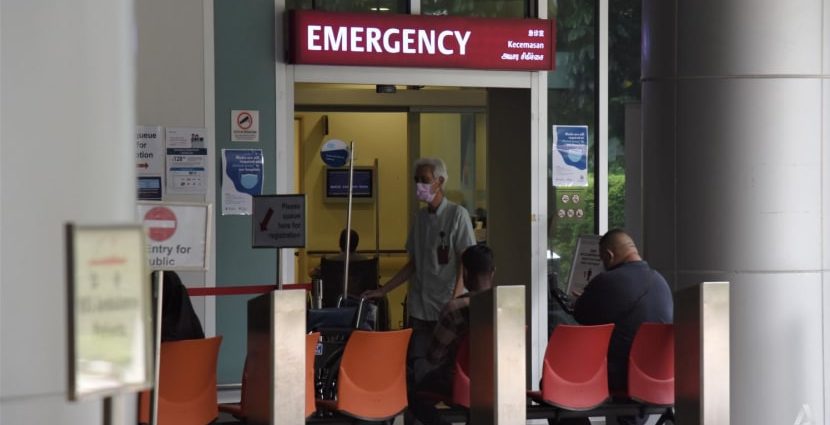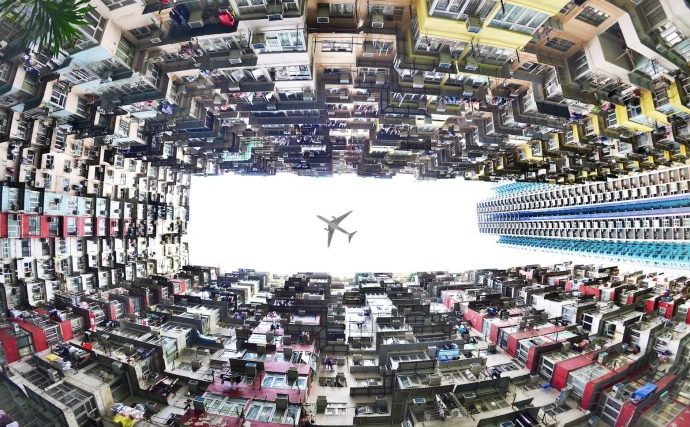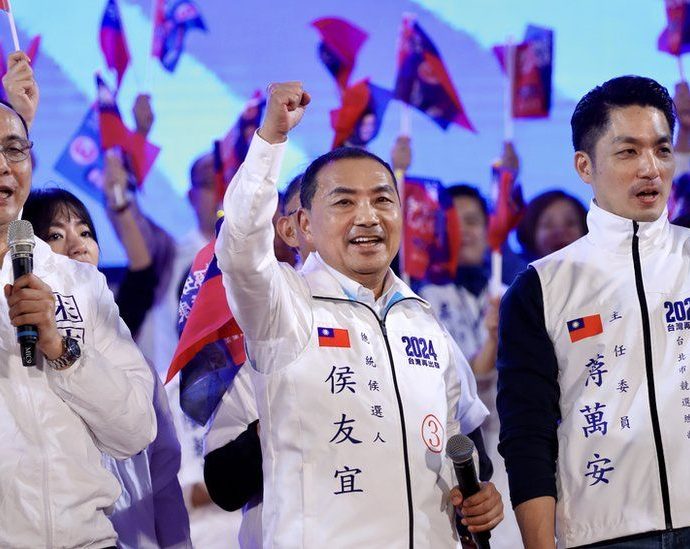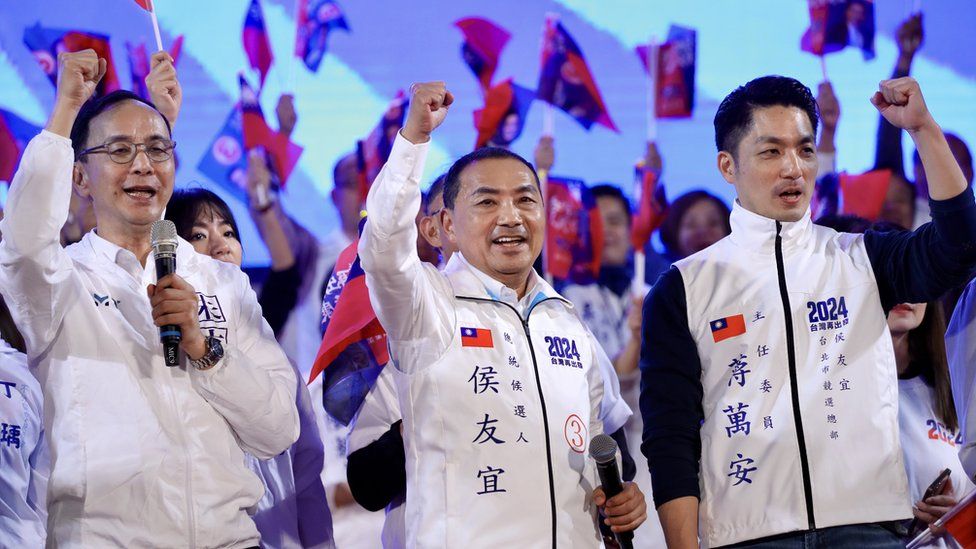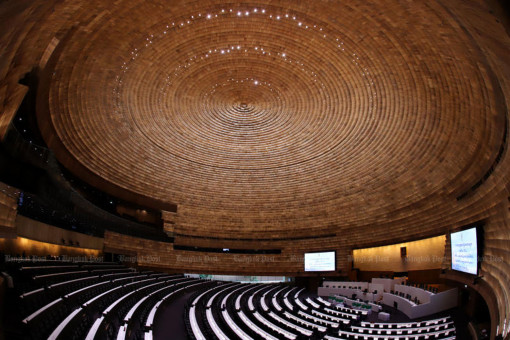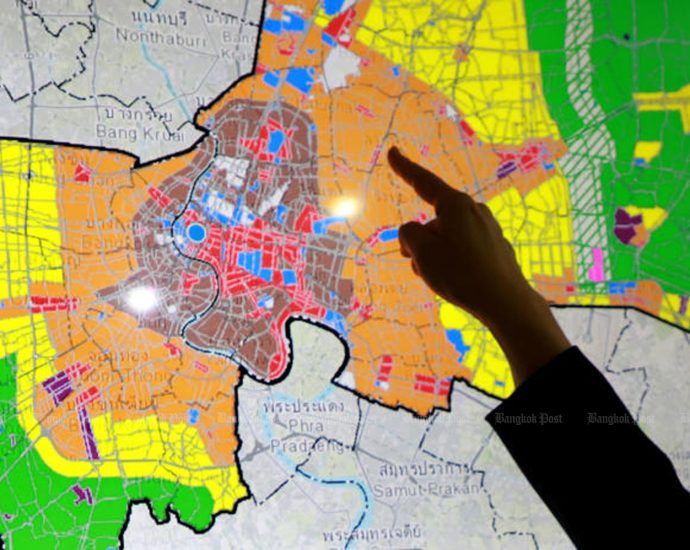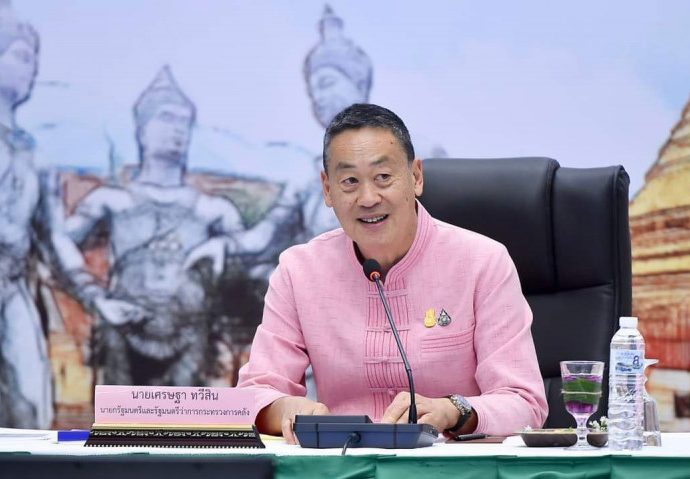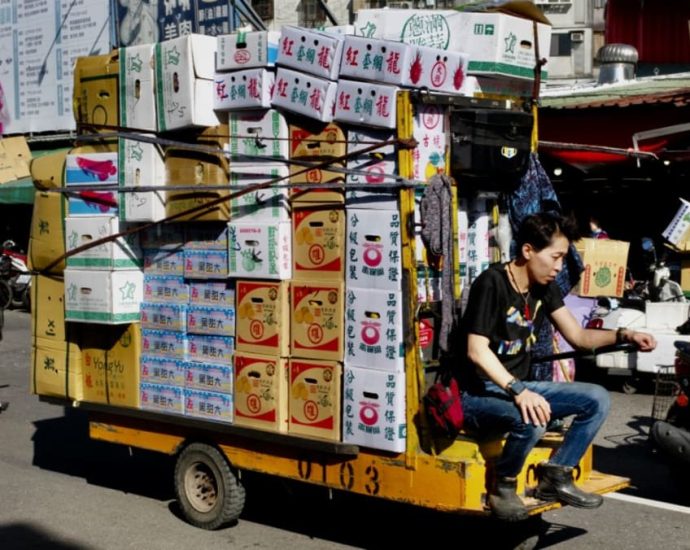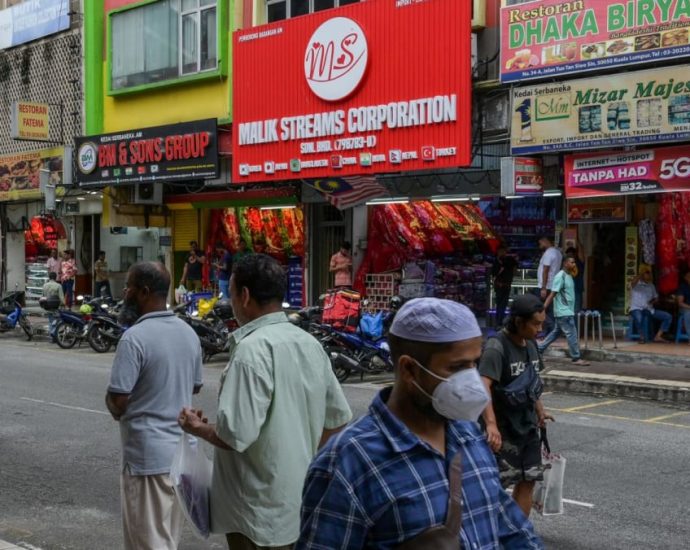Heart of the Matter Podcast: If more hospital beds isn’t the solution, what is?
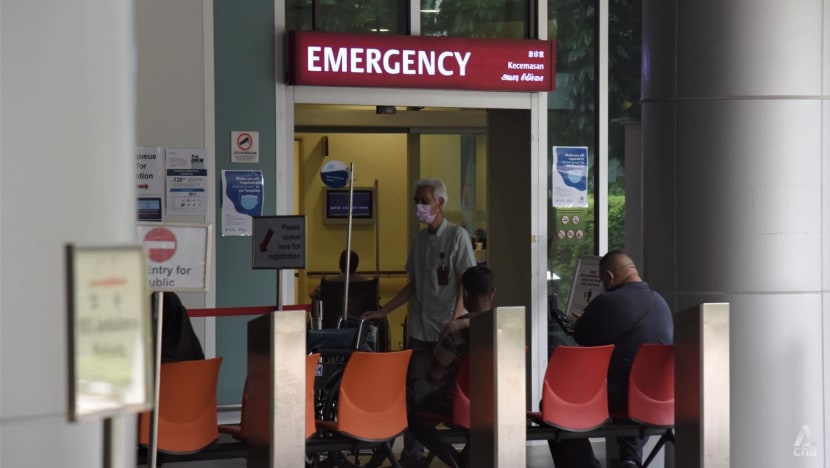
Patients have reported waiting for days to get a bed at a public hospital. Health experts say the biggest reason is that there are issues transiting to proper care after discharge.
Otelli Edwards speaks to public health specialist Dr Jeremy Lim, Duke-NUS Medical School’s Dr David Matchar and Jeremy Lee, assistant chief operating officer at the National University Hospital.
Whatâs a risk you took that youâre proud of? These women in Singapore share their inspiring stories

My youngest daughter Samirah was 16 when she was diagnosed with Crohn’s disease, a type of inflammatory bowel disease that can lead to abdominal pain, severe diarrhoea, fatigue and malnutrition. Due to this, she experienced severe stomach pain and was hospitalised often.
It was manageable when she was home, but difficult when she moved abroad. After her O Levels, Samirah enrolled in a pre-university institution in Kuala Lumpur (KL), Malaysia. When her condition flared up, I would take urgent leave, and my husband and I would drive up to KL to be by her side.
But when she went to Belfast, Northern Ireland, for her university degree, it got really tough. While the medical professionals there were more familiar with her condition and she received free medical treatment as a student, she struggled being alone.
Eventually, she fell into severe depression.
In March 2022, I had to make a decision: Stay in my teaching job or quit to take care of my daughter full-time in an unfamiliar country.
I had to consider my financial situation. Even though my other daughters, aged 28 and 27, were able to support themselves, it was tough to leave a stable income as my husband and I were both supporting our parents.
I also had to consider the responsibility I had as a teacher. I was teaching O-Level students then and to leave in April meant that I couldn’t guide them for the rest of the year.
But I knew being a mother was the biggest priority, so I took a risk and left the service.
After ensuring that matters would be cared for in our absence, my husband – who had decided to retire to be with Samirah – and I flew to Belfast to be with our daughter.
Since then, I’ve taken care of her, accompanying her to medical appointments, and supporting her.
Leaving my job and the rest of my family was a scary decision. I was aware that I’d lose my income – I didn’t know if we could survive on just our savings – and I wasn’t sure if Samirah would get better.
But I didn’t want to overthink it. I just knew that my daughter needed me and I had to be there for her.
Samirah graduated later that year and secured a research job in Newcastle, and we moved there with her. For her, I would risk it all over again.
KAVITHA KRISHNAN, ARTISTIC DIRECTOR, 52
The risk she took: She opened two dance companies that welcome people with disabilities.
Thereâs both more and less US inflation than meets the eye
The US Consumer Price Index rose by 3.4% in the year through December 2023, somewhat higher than the consensus forecast, mainly due to a big jump in the reported cost of shelter, which rose 6.2% year-on-year. The shelter number is bogus; rents on new apartments reported by Zillow and Apartmentlist.com have fallen during the past year, and during each of the past five months.

The Bureau of Labor Statistics, which calculates the Consumer Price Index, reports what it thinks is the average cost of renting a home. But the cost of a new lease as reported by Apartmentlist.com is falling. It takes about 12 months for the BLS estimate to catch up with the change in new rentals.

The official CPI shelter number will catch up to the observed cost of new rentals later in 2024, and the BLS will report a decline in the cost of housing, which makes up a third of the price index.

The price of goods also is falling after the COVID surge, when consumers scrambled to buy autos (to avoid public transport) and work-at-home electronics. An important factor is the falling cost of imports from China, due in part to the fall in China’s exchange rate vs. the US dollar.
The Federal Reserve and Fed-watchers in financial markets focus on something quite different: In the Fed’s flawed economic model, wage growth is the main driver of inflation. Labor shortages during the COVID shutdowns pushed the year-on-year change in average weekly earnings to 7%, and the year-on-year rate is still around 4%.

Since the Fed wants 2% inflation, the Fed-watchers reckon, it will keep interest rates high until demand for labor shrinks and wage increases fall back to the 2% annualized level. That’s why Treasury yields jumped after the Bureau of Labor Statistics last week reported larger-than-expected December employment growth.
It doesn’t really work that way. Most of the employment growth during the past year has been in low-wage fields like health care, education, and leisure and hospitality, which showed very little wage growth during 2023. Sectors that showed very high wage growth like manufacturing had no growth in employment at all.

The sector with the highest growth in employment (up 4.2% in 2023) was education and health services, which had wage growth of just 2.4%. The sector with the lowest employment growth (almost unchanged during 2023) was manufacturing, where wages rose by almost 6%.
As US manufacturing wages rose, largely due to a shortage of workers, Americans bought more goods from overseas. The US trade balance in goods jumped from a $720 billion annual deficit just before the Covid epidemic to a $1 trillion annual deficit during 2023.

The fact that there isn’t much inflation according to standard statistical reporting is small consolation to consumers, who can’t afford to buy cars or houses.
The monthly cost of running a car now stands around $1,000 – about $700 average car payment, $150 insurance, and $150 to $200 in gas. In 2018, it was only $600. A lot of the difference is due to the much higher cost of financing cars, along with the jump in the price of new vehicles.
The average cost of a mortgage on a new home, meanwhile, is $2,883, compared to a median cost of existing mortgages of just $1,775. That’s the result of the Fed’s interest-rate hikes. The Fed created a great deal of inflation that wasn’t there before by raising interest rates.
The inflation burst of 2020-2021 had little to do with interest rates. The culprit was $6 trillion in additional Covid subsidies by the Trump and Biden Administrations. Trump’s largesse was defensible given the shutdown of the economy. Biden doubled down on the Trump subsidies after the epidemic was largely over and the economy was recovering. Interest rates had very little to do with it.
For US consumers, the bottom line is that the selling price of homes, the cost of new leases and the price of most consumer durables will fall slightly – but nobody will be able to afford to buy anything, because the cost of financing will remain impossibly high for an extended period of time.
In terms of real cash outgo, there’s a lot more inflation than meets the eye, thanks to a misguided Federal Reserve.
Taiwan election: It’s not war young voters worry about – it’s jobs

Ziwei can still remember the months she spent huddling alone in a tiny shoebox apartment in Taipei.
There was no window in the 10-sq-m studio, just a small vent near the ceiling. It perpetually stank of sewage, even after she stuffed her shower drain with plastic bags. And the walls were painted in just the oddest shade of orange.
“With no windows, I felt so sad,” the 32-year-old recalled. “I would stay out really late every night, and I would come home only to sleep.”
But it was all she could afford in 2019 after breaking up with her boyfriend and moving out. Though she was a civil servant – considered to be a good job – her monthly pay was NT$40,000 ($1,285; £1,011) at the time, well below the national average.
Low wages and housing will be on the minds of Ziwei and six million Taiwanese voters under the age of 40 on Saturday, when they choose their president and parliament.
As it does at every election, the question of China’s claims on Taiwan and how the island should respond to Beijing’s threats looms large. But this time voters are more concerned about the economy.
A recent survey of 15,000 Taiwanese by Commonwealth Magazine saw most stating that economic development should be their next president’s top priority, over national security and cross-strait relations. It was especially crucial for respondents aged between 20 and 39.
After eight years in power, the Democratic Progressive Party (DPP) is coming under fire for failing to adequately improve people’s lives, especially younger Taiwanese.
Rising house prices and rentals, stagnating incomes, a significant youth unemployment rate, and an annual GDP growth hovering around 2% have worried many. More than a third of low-wage workers are aged below 30, according to an analysis provided to the BBC by labour expert Lee Chien-hung from the Chinese Culture University.
It’s given rise to social phenomenon such as the “beipiao”, youths from poorer parts of Taiwan seeking better jobs in the capital while grappling with rising rents. There’s also the “xiegang”, young workers juggling multiple jobs to earn a decent wage, and the “yueguangzu”, those who live paycheck to paycheck with no savings.
Kaili, a friend of Ziwei’s, is a “beipiao” from the southern city of Chiayi resigned to a lifetime of renting in Taipei.
When it comes to buying her own home “I’ve given up hope”, said the 37-year-old, who works in documentary films.
“I can’t see the reason why I should buy. My salary is quite low. I don’t think I can afford to put down a deposit on a home, not now, not even in years’ time.”
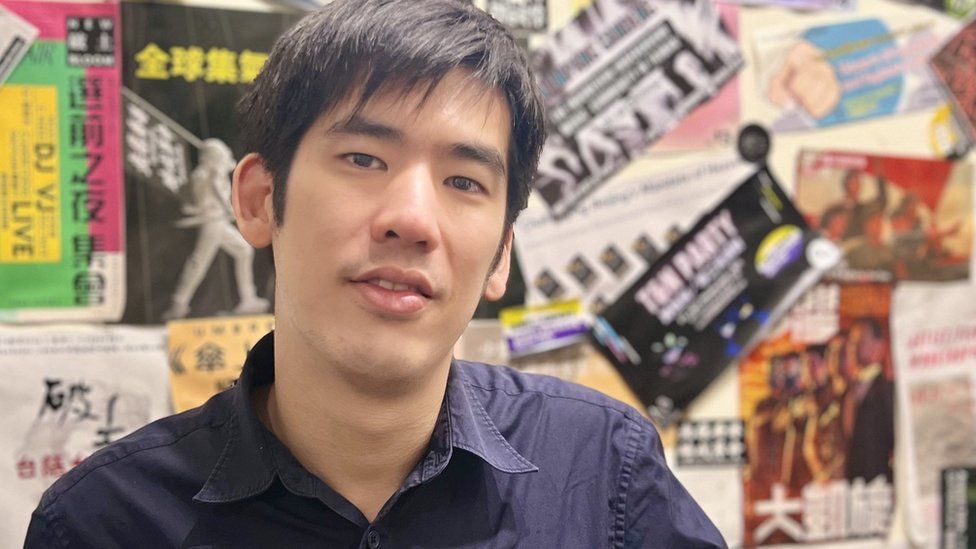
“There’s a saying these days – to afford a home in Taipei, you can’t eat or drink for 15 years,” said Brian Hioe, a young Taiwanese political commentator and editor of online magazine New Bloom.
“There’s this anger against the DPP for failing to address these longstanding economic issues that face Taiwan.”
He noted this sentiment is particularly visible among Gen Z voters who view the party as the establishment, and have little memory of the Kuomintang (KMT) government that came before the current DPP rule.
And while the DPP has won votes in the past campaigning on protecting Taiwan from China, this strategy has worn thin the patience of some young voters. They “feel that the cross-strait issue is something political parties just leverage on to win elections” at the expense of other issues, he added.
Opponents of the DPP are hoping to tap on their frustration.
The KMT, the other major political party in Taiwan, casts the DPP as corrupt and inept and has promised change. Once the incumbent that ruled the island with an iron grip, it has alternated power with the DPP every eight years since 2000.
But it is the upstart Taiwan People’s Party (TPP) led by Ko Wen-je that has gained traction among young voters, especially those disillusioned with the two main parties. The former surgeon has gained fans for his rational and straight-talking persona, though he has also been criticised for remarks perceived as sexist and homophobic.
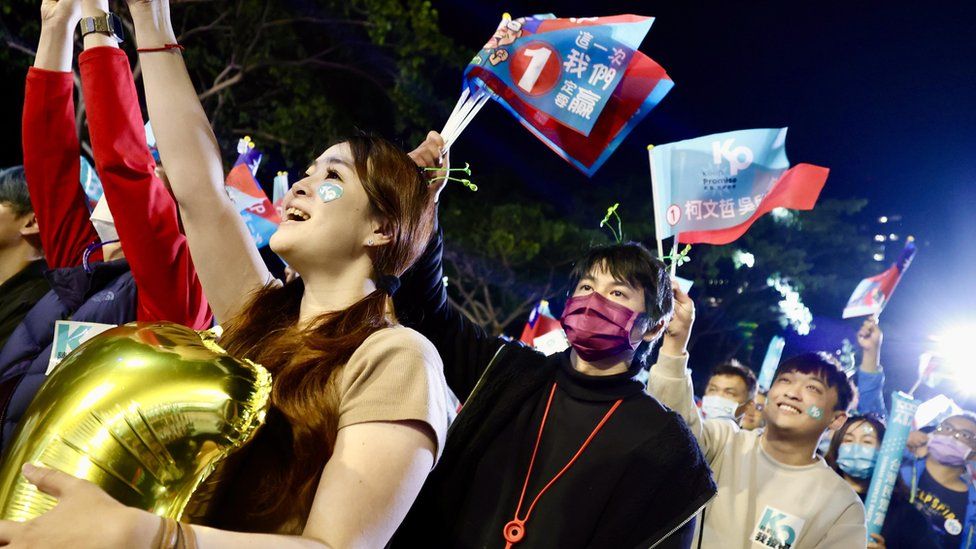
On a chilly Wednesday night in the port city of Keelung, a crowd made up mostly of young families and couples gathered by the waterfront for a TPP rally. They cheered as speakers urged them to “smash the blue and green”, a reference to the KMT and DPP’s party colours, and waved placards with one of Mr Ko’s campaign slogans, “Keep Promise”.
Among them was Harrison Wu, a 25-year-old engineer. He voted for the DPP in the last election, which he now regrets.
“[President] Tsai Ing-wen has been too soft,” he said, before launching into a litany of complaints ranging from exorbitant housing prices and low wages to party corruption scandals.
“They had control of the legislature for eight years and didn’t get anything done. Now they are asking us to vote in a DPP majority again, but what’s the point?”
The DPP is aware that young people are losing faith in them. It has promised to build more affordable housing, raise the minimum wage, and invest in upskilling younger workers so they can get better jobs.

Read more about the Taiwan election:

It’s also appealing to millennials for their support. Its latest campaign ad is dedicated to the Sunflower Movement generation that organised anti-China protests a decade ago, paving the way for the DPP to kick the KMT out of government in 2016.
With a melancholic soundtrack, set to shots of people moving backwards and references to the KMT, the ad warns youths that Taiwan’s progress achieved under the DPP could be rolled back if they lose power.
“You feel a bit exhausted, you don’t want to speak out because it’s too troublesome,” a young man’s voiceover says soothingly. “But the very thing you didn’t want is now returning.”
“You once stood up for your beliefs, once saw the vote in your hands as the most important thing… Only you can make the choice so that Taiwan can be our Taiwan.”
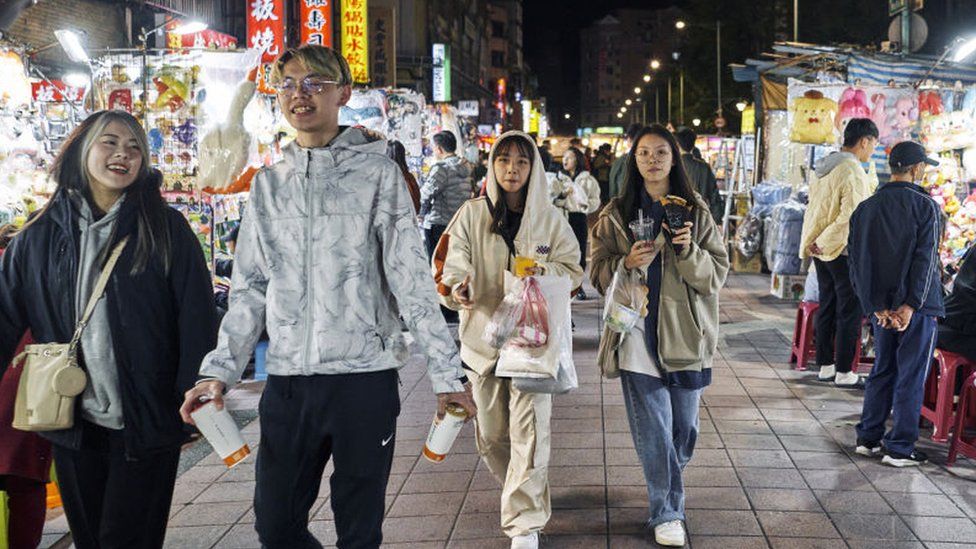
Bursting bubble
For decades successive Taiwanese governments have discussed how to solve issues such as low wages “but no matter which party [is in power] it still hasn’t been accomplished,” said Dr Lee, the labour expert.
“The government must dutifully face society’s problems and stop its empty talk.”
Lev Nachman, a political scientist at the National Chengchi University, said this election all three parties have offered similar proposals to help young voters, but whoever wins must make solving economic issues their top priority. “It will be a bubble that will pop, if they do not.”
But in some ways that’s already happening. Taiwan is seeing a brain drain as young people seek better prospects elsewhere.
Migration data shows that, excluding the pandemic years, the number of Taiwanese working overseas has steadily increased in the past decade. Nearly half of them are aged under 40.
Ziwei is planning to stick around for now. She’s found new love, and new digs.
These days she lives in a much bigger apartment in New Taipei City with her husband Wenjing, Kaili, and another friend. Thankfully there are windows, it doesn’t stink, and the walls are painted an inoffensive white.
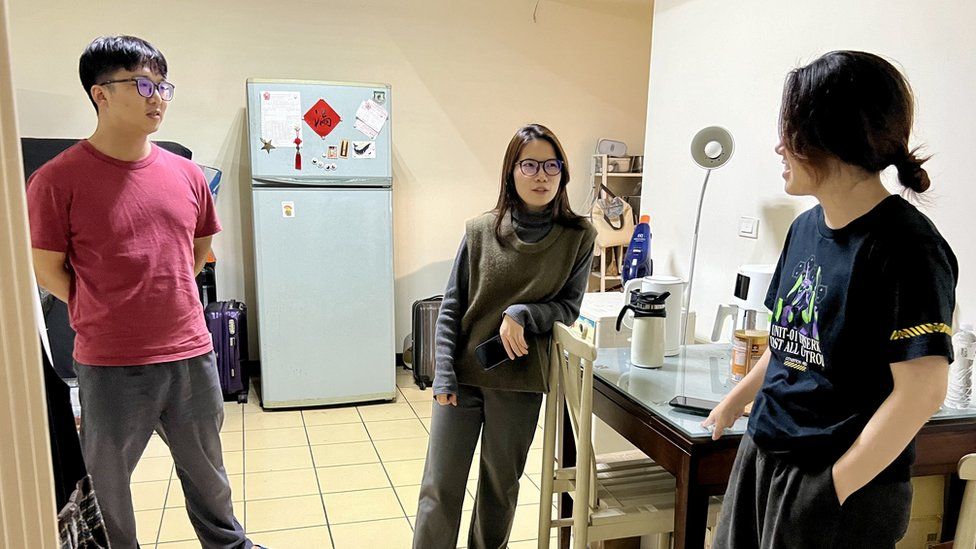
Do the housemates have hope for their future in Taiwan? Despite their worries, they all said yes.
“I think my life will get better. Well, it’s definitely better now than when I was 20, I was much poorer then!” said Kaili with a laugh.
Ziwei and Wenjing said they recently managed to scrape together enough money to make the down payment on a new apartment.
They’re looking forward to having a place of their own so they can start a family. But they also wonder if they can afford to raise a child and pay for their home.
“If you don’t have help from your own family, and rely on your own income, it can be quite hard,” said Wenjing, who works as a vet.
But they’re determined to make it work. “We are saving up and cutting down our expenses. We share the same values, we’re willing to work hard for a common goal,” said Ziwei.
“So when it comes to my future, I feel things will get better. And that’s because I have a great partner by my side.”
Additional reporting by Joyce Lee.
Related Topics
-
-
2 days ago
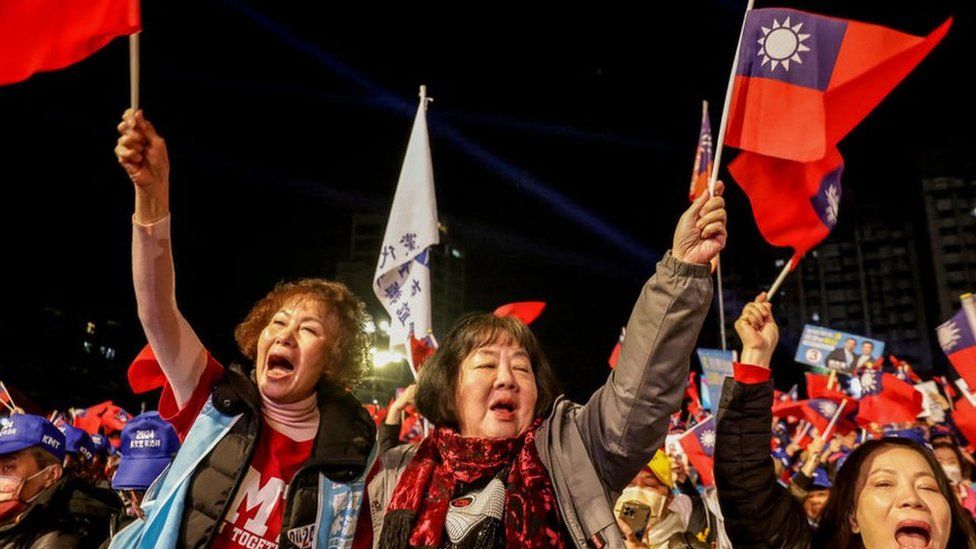
-
-
-
3 days ago
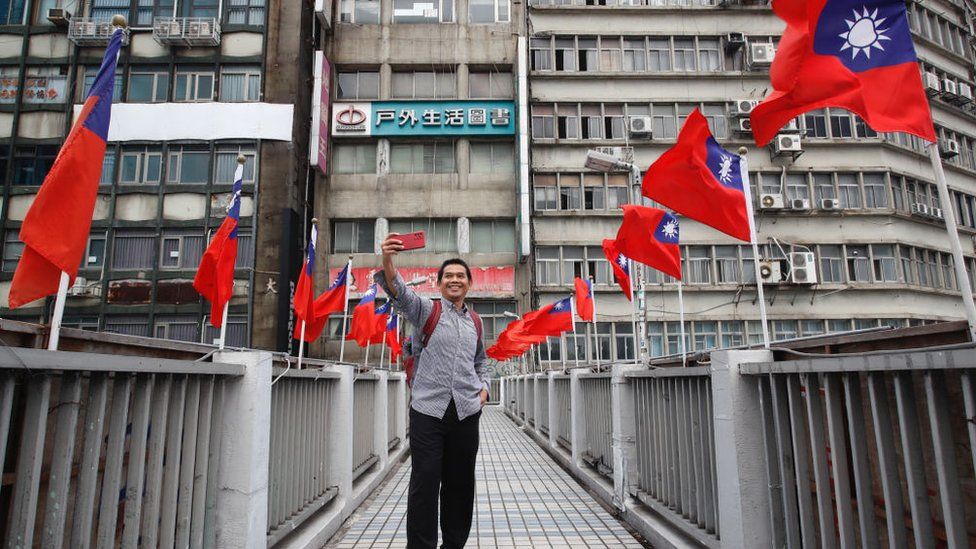
-
3 ex-Bhumjaithai MPs banned for life for proxy vote
PUBLISHED : 12 Jan 2024 at 05:52

Three former Bhumjaithai Party MPs have been slapped with life bans prohibiting them from contesting elections or holding political office again for proxy voting during the second and third readings of the 2020 budget bill.
The Supreme Court ruled that Chalong Thoetwiraphong, a former Phatthalung Constituency 2 MP, Phumsit Khongmi, a former Phatthalung Constituency 1 MP and Natee Ratchakitprakarn, a former list MP, deliberately breached ethics by allowing other lawmakers to use their electronic voting cards during the bill readings between Jan 10-11, 2020.
Mr Chalong and Mr Phumsit were suspended as MPs on Sept 3, 2021, when the court accepted the case forwarded by the National Anti-Corruption Commission (NACC). Ms Natee lost her MP status in a false asset declaration case before the lawsuit was filed.

Chalong: Breached ethical code
In its ruling, the court said the three politicians failed to take any action that would prevent others from using their cards, investigate to find those who did or report the proxy voting to the House Speaker.
They claimed they had other engagements, but this did not justify them leaving their cards with others, and their arguments could not disprove the allegations of proxy voting, the court said.
The life ban against the three followed a Supreme Court Criminal Division for Political Office-Holders ruling last May in which each of the trio was sentenced to nine months in prison over the charge. They were released on bail pending an appeal.
The proxy voting questioned the validity of the 2020 budget bill, and the Constitutional Court ordered a fresh vote on the budget proposal.

Phumsit: Suspended as MP in 2021

Natee: Lost MP status for hiding assets
Chadchart defends city zoning plan
Critics blast it as being ‘pro-developer’
PUBLISHED : 12 Jan 2024 at 05:33

Bangkok governor Chadchart Sittipunt on Thursday defended the fourth revision of City Hall’s plan for the city, which has attracted public criticism for being “pro-developer”.
Responding to the backlash, Mr Chadchart said City Hall is always open to constructive criticism but added that some opinions may cause social disunity.
The governor said via Facebook that, by law, the plan needs to be revised every five years to support the city’s growth.
Responding to criticism, he said the new plan aims to enhance people’s living standards.
Public hearings are under way before the plan is submitted to a Provincial City Plan Committee for further processing.
At one hearing on Saturday, Korn Chatikavanij, former finance minister and representative of a civil group, said the plan seemed to emphasise making the city more dense rather than improving the quality of people’s lives. Mr Korn also questioned the reason for expanding 148 roads around the city that City Hall claimed would support the railway system.
He believed the road expansion would benefit the construction of skyscrapers in residential areas, as the law prohibits high-rise buildings from being built on small roads.
He also commented against an FAR (floor-to-area ratio) bonus, saying that City Hall needed to include the measure as a prime condition for developers to lessen the chance of corruption.
Sophon Noorat, head of the Rights Protection and Protection Department of the Thai Consumer Council (TCC), said that the plan tended to support development and did not focus enough on people’s quality of life.
Kongsak Sahamontree from the Urban Life Quality Protection Community Network said the plan lacks public participation. He suggested that people’s opinions be heard and the plan revised accordingly.
Wisanu Subsompon, a deputy Bangkok governor, said on Tuesday that the plan was written based on the city’s expansion and changing area usage to increase green space for the public.
Colour coding used in the plan was for the public’s benefit, not for certain groups of developers, he added.
The public has at least 90 days to comment on the plan before approval, said Mr Wisanu.
Electric mass transit seen as answer to PM2.5 woes
PUBLISHED : 12 Jan 2024 at 05:22

CHIANG MAI: Prime Minister Srettha Thavisin vowed to promote electric mass transit to help solve the nagging air pollution problem in this northern province.
During his two-day trip that ended on Thursday, Mr Srettha said the situation had seemingly improved since his previous visit on Nov 28, as the level of fine particulate matter smaller than 2.5 microns (PM2.5) was significantly lower in the provincial capital than last year.
This situation was seen to have improved since last April, when 302 hotspots were detected by the Geo-Informatics and Space Technology Development Agency (Gistda) alone, rendering the situation critical.
Air pollution has also impacted tourism in Chiang Mai as both local and foreign visitors did not want to visit the province due to the perceived health risk, Mr Srettha said, adding the government and local authorities have implemented solutions with short to long-term plans to show their commitment to tackling the problem.
The government, especially the Transport Ministry, is now planning to improve the province’s mass transportation system to help curb the PM2.5 caused by traffic congestion, the premier said, adding the mass transport system will also be convenient for tourists.
“Chiang Mai is a big city, but it doesn’t yet have rapid mass transit. It should have a monorail service, and that would benefit local commuters as well as help boost the economy,” he said.
During the trip, Transport Minister Suriya Jungrungreangkit proposed many development projects for the province’s transportation.
Among them was one to replace the present mass transport service or red pickup trucks known in Thai as songthaew daeng with EVs.
The minister also proposed an outer ring road to link Chiang Mai Airport to popular tourist sites in the city. The route would be about 53km long and would help ease congestion in the city, said Mr Suriya.
The ministry also plans to construct Lanna Airport, the second Chiang Mai airport, on an 8,000-rai site in the San Kamphaeng district of Chiang Mai and Ban Thi district in neighbouring Lamphun province.
Another plan would see the introduction of a tourist bus service to seven popular sites including a night safari, Royal Park Rajapruek and Queen Sirikit Botanic Garden.
Mr Suriya said the Land Transport Department would find tour bus operators for the service.
Mr Srettha said he agreed with the ministry’s projects to reduce congestion and the associated PM2.5.
“It is a well-planned policy. I believe it can help boost the public transportation service, and that will benefit the province’s tourism sector,” he said.
The premier also said he would contact Hun Manet, the prime minister of Cambodia, to discuss reducing PM2.5 caused by burning farmland.
Gistda reported at 8am on Thursday that 10 provinces were experiencing red-coded (seriously harmful) pollution levels.
Taiwan Votes 2024: As tariff spat with China widens, outcome of presidential election could reshape cross-strait trade
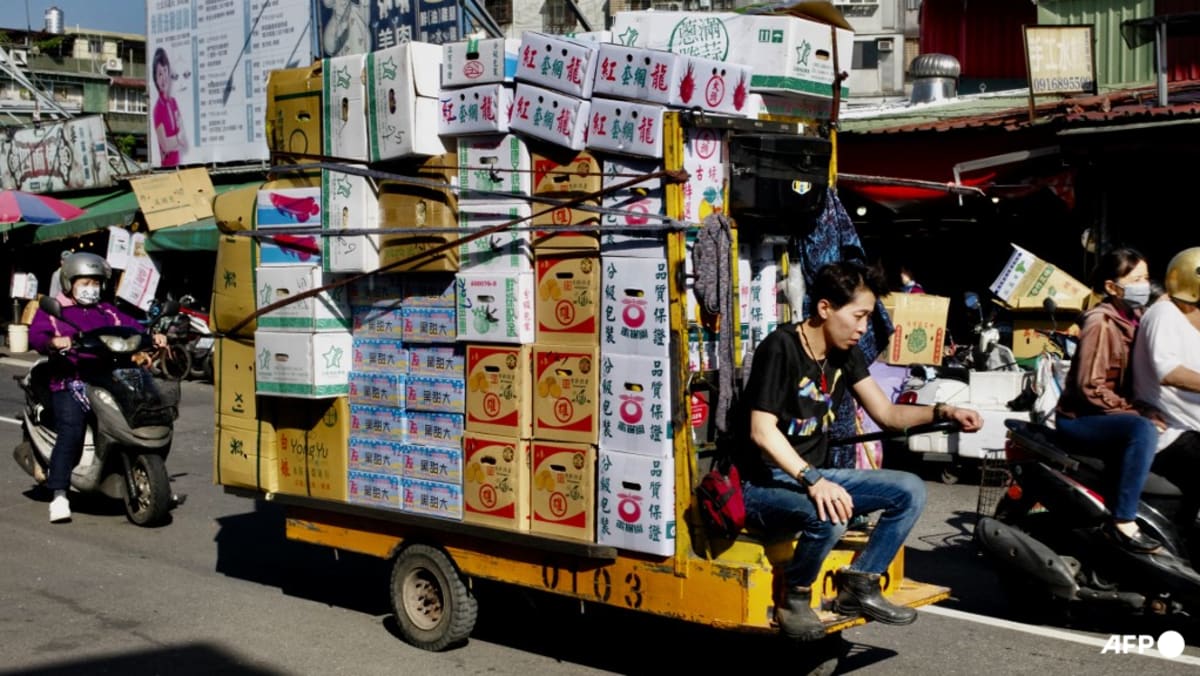
CHINA’S TRADE INVESTIGATION
Given the timing of China’s trade investigation and findings, it is widely seen as an attempt to sway the outcome of Taiwan’s election. But experts say there are also genuine economic reasons.
“China has two objectives. Of course, one is that they want Taiwan’s people to elect a government that will be advantageous to relations between both sides. The other objective is that some of China’s industries need the Taiwan market,” said Dr Du Zhen-hua, adjunct associate professor in global business at Chinese Culture University in Taipei.
China is Taiwan’s top trading partner, with cross-strait trade totalling US$224 billion last year. The island runs a trade surplus with its much larger neighbour, which accounted for about 35 cent of Taiwan’s exports in 2023.
The roughly 2,500 Chinese imports that Taiwan bans cover a wide range of goods including agricultural produce, natural and synthetic fibres, household electronics, steel products and vehicles. The bans are intended to protect domestic industries.
China’s report on its trade investigation contains estimates of the lost value of exports linked to Taiwan’s restrictions. According to relevant business associations, for example, mainland firms have missed out on exporting US$2.5 billion worth of fresh vegetables and US$170 million worth of fruits to the island.
“Taiwan is not a huge market, but it is at least a medium to large one, around the 20th largest economy in the world, and its import restrictions have hurt the development of Chinese businesses,” said Dr Du.
He added that China “has a basis” for its claims that the island violated ECFA, which came into effect in 2010 and committed both sides to gradually reducing or eliminating tariff and non-tariff barriers, as well as WTO rules on eliminating trade restrictions.
Commentary: Asian Cup kicks off in Qatar amid rising tensions in Middle East
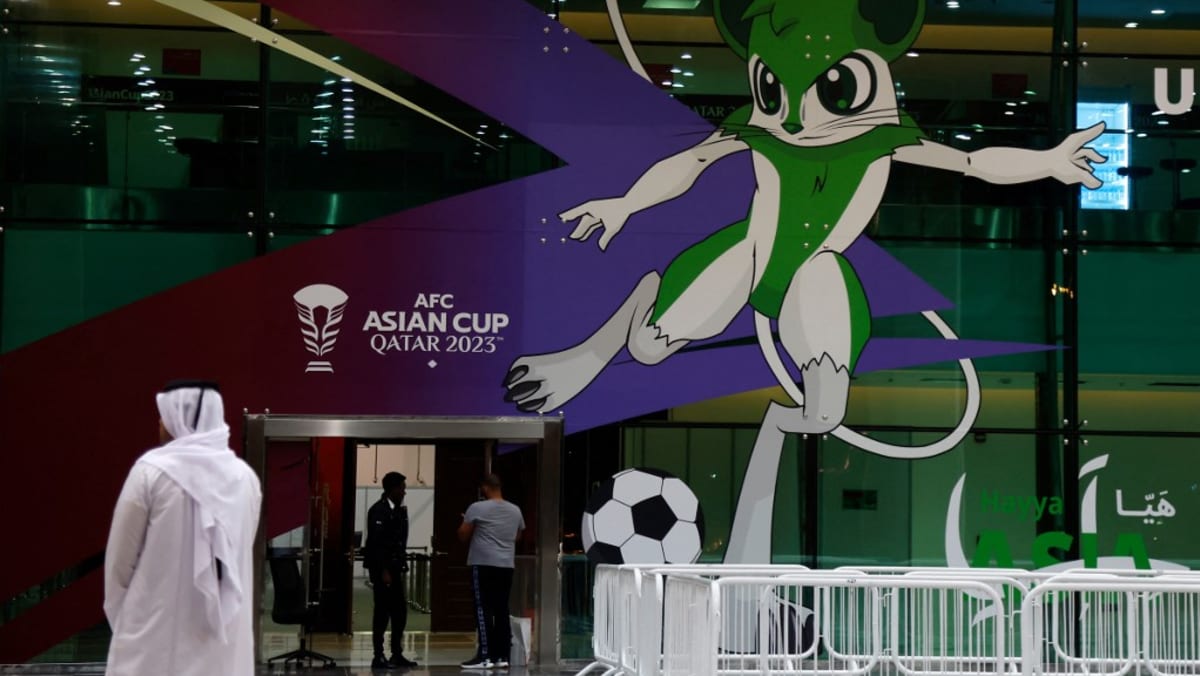
WHEN FOOTBALL AND POLITICS MIX
At the 2022 World Cup, Qatar established itself as a reliable host capable of successfully delivering events, a focal point for communicating a vision of Arab unity and a legitimate, trustworthy member of the international community. Officials in Doha will no doubt be seeking to do more of the same, especially given recent turbulence in the Middle East.
Over the last few years, Qatar has engaged in diplomacy between the United States and Taliban government in Afghanistan, arranged a hostage swap involving Iran and the United States, and been instrumental in negotiating the release of Gaza hostages in the Israel-Hamas war.
At the Asian Cup, Qatari officials will need to deploy their soft power and diplomacy to full effect, not least because of several teams that have qualified for the tournament.
The Gaza war has resulted in the deaths of several Palestinian football players and has posed challenges for the national team in preparing for the tournament. In its first match, the Palestinian team will face Iran – the country accused by Israel, the US, and their allies of being behind Hamas attacks, and of supporting Hezbollah in Lebanon.
At the 2022 World Cup, Iran drew the world’s condemnation as at the time women in the country were being arrested and beaten for refusing to cover their heads in public. This issue may resurrect itself once again, though the UAE’s appearance in the same group as the Iranians and Palestinians suggests more prominent issues may arise. Football and politics ideally should not mix, but very often they do.
Throughout the recent conflict, the UAE’s Etihad Airways has been one of the few international airlines that has continued to fly into Tel Aviv. This follows its normalisation of relations, in 2020, with Israel – a process from which several football deals emerged. Tournament host Qatar has always refused to follow suit, while Saudi Arabia has paused plans for normalisation following Israel’s military action in Gaza.
With this year’s Asian Cup taking place against a backdrop of such conflict and uncertainty, Saudi Arabia heads to it trying to establish a more progressive, responsible international reputation.
Nowhere has this been more evident than its investments in football. Five years ago at the Asian Cup, the kingdom came second in its group then exited in the round of 16 – an underwhelming performance compared to its smaller neighbours Qatar and the UAE (which reached the semi-final stage).
This time round, having spent heavily on overseas player acquisitions and its domestic league, Saudi Arabia will be hoping to play well and project a positive image of the country. The Asian Cup will not be a litmus test of the returns on its investment in football, but of how football in the kingdom is developing.
Raids in Kuala Lumpur targeting undocumented migrant workers highlight rising anti-foreigner sentiment in Malaysia
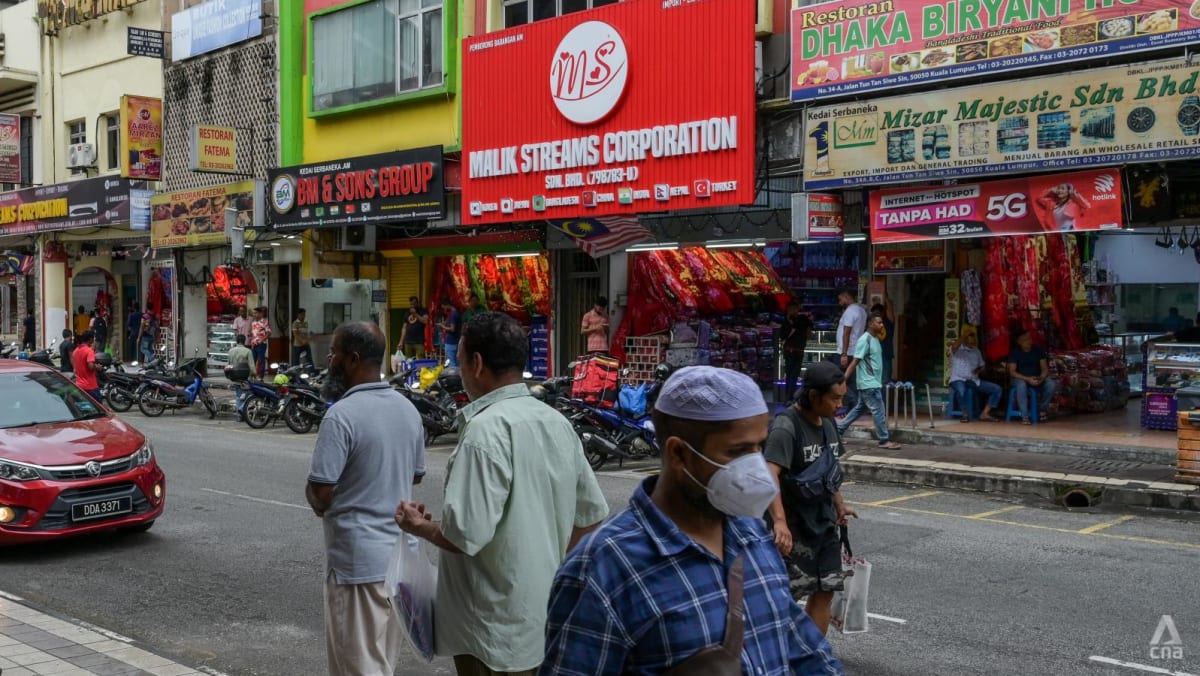
ANTI-IMMIGRANT SENTIMENT RISING, EXACERBATED BY SOCIAL MEDIA
In his videos, Mr Sophian – who has been accused of stirring up anti-immigrant sentiments – goes up to migrants who work in restaurants or grocers and questions them on their right to work in Malaysia.
He has been filmed in Kuala Lumpur, Melaka, and Penang among other places and has also ambushed areas that have large populations of Rohingya refugees.
Some of his videos posted on TikTok have racked up hundreds of thousands of views.
His actions have generally been supported by many people who tell him to keep up his work.
“We love our country, so this has to be done. The foreigners are getting big headed and taking advantage. Continue the good work,” read a comment on one of his videos taken at Jalan Silang.
Mr Sophian, who heads a non-governmental organisation called Surplus, told CNA that he was only against undocumented migrants in the country as well as businesses that were owned by them.
He also takes issue with businesses that hire migrants and place them in front-facing positions such as cashiers, claiming that this takes away jobs from locals.
“Every country has laws and any foreigner who wants to come into the country has to abide by the laws,” said Mr Sophian.
He further claimed that his “ambushes” have been ongoing for more than a year to put pressure on the government to take action.
“This is a critical issue and I want Malaysians to see what is really happening on the ground. If I make a complaint online, it will take a long time for any action to be taken,” he said, adding that he believed the raids in Jalan Silang for instance were conducted after his “ambushes”.

